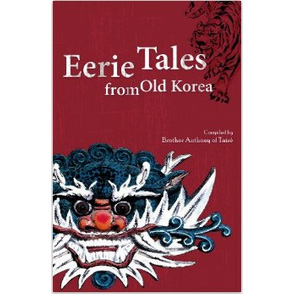 Just in time for Halloween, Brother Anthony of Taize has put together Eerie Tales from Old Korea. The book is a compilation of stories collected by missionaries Homer B. Hulbert and James S. Gale. Hulbert and Gale were both fond of ghost stories and spent many years fruitlessly chasing down Korean ghost stories as scholars who were Korean originally insisted that such stories did not exist, presumably because these stories were associated with folk beliefs, and therefore not ‘serious’ enough to consider (Thus these Koreans were some of the first “gatekeepers” of Korean culture – deciding what was “representative” and “proper” to disseminate).
Just in time for Halloween, Brother Anthony of Taize has put together Eerie Tales from Old Korea. The book is a compilation of stories collected by missionaries Homer B. Hulbert and James S. Gale. Hulbert and Gale were both fond of ghost stories and spent many years fruitlessly chasing down Korean ghost stories as scholars who were Korean originally insisted that such stories did not exist, presumably because these stories were associated with folk beliefs, and therefore not ‘serious’ enough to consider (Thus these Koreans were some of the first “gatekeepers” of Korean culture – deciding what was “representative” and “proper” to disseminate).
Thankfully, Hulbert and Gale persevered, and eventually collected a group of yadam, short stories which were particularly popular in the Joseon period. Brother Anthony has sorted through these tales, and selected 29 of the best for his book. The first section of the book is stories from Hulbert, and the second from Gale.
Hulbert’s stories include ghost stories and more; also tales of local belief, legend, and folklore. Some do feature ghosts, but others feature stories of unlikely success against odds, trickery, and deceit.
A Submarine Adventure, for instance, combines an undersea kingdom with a supernatural journet, a miraculous seal, and end up telling the apocryphal story of how the temple Haeinsa (which today houses the Tripitaka) was first built. The Goose that Laid the Golden Egg is exactly as it sounds, the Korea retelling of that morality play, though in this case the ‘egg’ is silver.
There are also more traditional ghost stories in which ghosts wreak havoc on the living in order to gain revenge, or make their grievances known (A Brave Governor) or attempt to steer the living into doing evil (Hen Versus Centipede), but in fact only make the taste of chicken more delicious (LOL, you have to read it to understand).
Gale’s works are a bit different, including what might be fairly called fairy tales (The Story of Jang Doryeong and The Home of the Fairies) and a group of short ephemeral stories that are far less focused. I have to admit I was a bit more fond of Hulbert’s translations although a Korean version of Dante’s Inferno (Hong’s Experience in Hades) was quite entertaining.
The translation is sometimes a bit odd, as Hulbert and Gale are fond of dropping in references to Shakespeare, bits of French, and anglicizing things (one policeman eats sauerkraut!), but this does not detract from the stories, and occasionally Brother Anthony steps in to make some obscurely translated phrase back into something in the Korean context.
It’s an entertaining collection of stories from the eerie side of life, and if you are interested in Korean folk culture in specific, or ghost and folk-tales in general, it’s a good choice.


